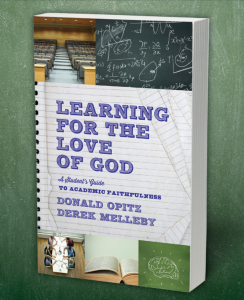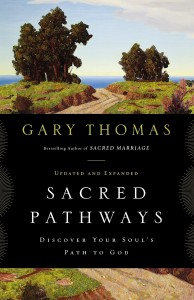
Why Are We Students?
We study in order to
understand God’s good creation
and the ways sin has distorted it,
so that, in Christ’s Power, we may
bring healing to persons and the created order.
As God’s image-bearers we are preparing
to exercise responsible authority
in our task of cultivating the creation
to the end that all people and all things may
joyfully acknowledge and serve
their Creator and true King.
— The Student Creed by Donald Opitz and Derek Melleby (Learning for the Love of God: A Student’s Guide to Academic Faithfulness. Brazos Press, 2014, 112-113).

The Student Creed was among the resources which my wife Theresa and I wove into The Intellectual/Conceptual Pathway (Manheim Brethren in Christ Church, 8/3/2014). The presentation (video) serves as the third in the local congregation’s developing Hunger & Thirst: The Many Unique Ways We Connect With God series, based upon Gary Thomas’ Sacred Pathways: Discover Your Soul’s Path to God (Zondervan, 2010)[1].
As members of InterVarsity Christian Fellowship’s Graduate & Faculty Ministries, we understood the invitation to be one of bridge-building, i.e., to enable those assembled at this partner congregation to “step into” the world/life of the intellectual by drawing upon our experience as servants of the Lord in the context of higher education and research. The overwhelming positive response to the first service, in particular by friends and family of “socially awkward” intellectuals, encouraged us that we were on the right track as we tweaked our second service presentation (video). In response to the desire expressed by several people to dig deeper, we will be providing a smaller, focused follow-up conversation[2]. Pray for the details to come together for this and a wider Tuesday, October 7 (7 pm) event featuring President Santa J. Ono, PhD, University of Cincinnati, on What is the Value of College?
Dear Lord,
We purpose
– Gratefulness for our opportunities, Appreciation for our giftedness;
– Precision in our reading, Accuracy in our writing;
– Understanding in our discussions, Humility in our knowledge;
– Thoughtfulness in our answers; Sanctification in our learning;
– Investment in our assignments; Godliness in our workmanship;
– Discipleship in our relationships; Commitment to our mission;
– Scholarship in our schoolwork; Cohesiveness in our worldview;
– Increase for Jesus, Decrease for ourselves, Glory for our Lord.May You make it so in us. Amen.[3]
Notes
- Enjoy working through the survey (online file) inspired by and adapted from Sacred Pathways, reading Chapter 1: Loving God (PDF) for an overview of the Nine Pathways (Naturalists, Sensates, Traditionalists, Ascetics, Activists, Caregivers, Enthusiasts, Contemplatives, Intellectuals) and considering some of the reflective material in the Study Guide (PDF). But keep in mind that these are broad generalizations derived from a “non-academic survey”. I would not be surprised if you (like me) find yourself with 2-3 overlapping “top pathways”, a few in the middle, and a strong separation with those at the bottom. FYI: When I took the book’s chapter specific survey for Intellectuals I aced it 😉↩
- Please let us know if you have recommendations of material to incorporate (including links, books, stories, videos, cartoons, questions, etc) and/or if your local congregation/fellowship may have interest in me exploring this topic with you at some point in the future.↩
- Mark Eckel, “The Christian Schoolman’s Prayer,” unpublished, 2006. Included in his Emerging Scholars Network Blog Post: Getting a ‘Big Head’? The Marks of a Christian Scholar: A Vocational Description (Part One). ↩
Tom enjoys daily conversations regarding living out the Biblical Story with his wife Theresa and their four girls, around the block, at Elizabethtown Brethren in Christ Church (where he teaches adult electives and co-leads a small group), among healthcare professionals as the Northeast Regional Director for the Christian Medical & Dental Associations (CMDA), and in higher ed as a volunteer with the Emerging Scholars Network (ESN). For a number of years, the Christian Medical Society / CMDA at Penn State College of Medicine was the hub of his ministry with CMDA. Note: Tom served with InterVarsity Christian Fellowship / USA for 20+ years, including 6+ years as the Associate Director of ESN. He has written for the ESN blog from its launch in August 2008. He has studied Biology (B.S.), Higher Education (M.A.), Spiritual Direction (Certificate), Spiritual Formation (M.A.R.), Ministry to Emerging Generations (D.Min.). To God be the glory!

Leave a Reply